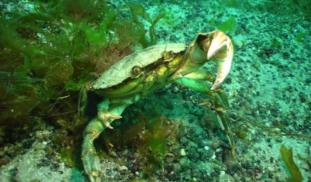Please wait...
About This Project
Coastal ecosystems are sensitive to human-induced pressure from fisheries and pollution that lead to localized extinctions of specific organisms. These extinctions disproportionately affect larger, predatory animals (megafauna), with cascading effects upon ecosystem-scale carbon cycling pathways. This project will test how selective removal of larger predatory organisms alters ecosystem structure and function, changing energy flow and carbon cycling pathways in coastal sediments.

Browse Other Projects on Experiment
Related Projects
Using eDNA to examine protected California species in streams at Hastings Reserve
Hastings Reserve is home to three streams that provide critical habitat for sensitive native species. Through...
How do polar bears stay healthy on the world's worst diet?
Polar bears survive almost entirely on seal fat. Yet unlike humans who eat high-fat diets, polar bears never...
Uncovering hidden insect diversity associated with a likely undescribed gall-forming midge
Does a likely undescribed species of gall-forming midge (pers. comm. Ray Gagné) on Eriodictyon plants (Yerba...




